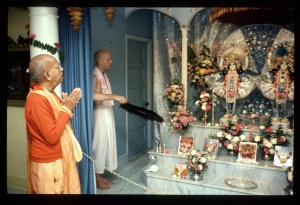SB 10.33.22: Difference between revisions
m (1 revision(s)) |
(Vanibot #0018 edit: make synonym terms in Sanskrit italic in SB - Vanisource) |
||
| Line 1: | Line 1: | ||
{{info | {{info | ||
|speaker= | |speaker=Śukadeva Gosvāmī | ||
|listener=King | |listener=King Parīkṣit | ||
}} | }} | ||
[[Category:Srimad-Bhagavatam - Canto 10 Chapter 33]] | |||
[[Category:Bhagavatam Verses Spoken by Sukadeva Gosvami - Vanisource|103322]] | |||
<div style="float:left">'''[[Srimad-Bhagavatam]] - [[SB 10|Tenth Canto]] - [[SB 10.33: The Rasa Dance|Chapter 33: The Rāsa Dance]]'''</div> | |||
<div style="float:right">[[File:Go-previous.png|link=SB 10.33.21]] '''[[SB 10.33.21]] - [[SB 10.33.23]]''' [[File:Go-next.png|link=SB 10.33.23]]</div> | |||
{{RandomImage}} | |||
{{SBnotice}} | |||
==== TEXT 22 ==== | ==== TEXT 22 ==== | ||
<div | <div class="verse"> | ||
tābhir yutaḥ śramam apohitum aṅga-saṅga- | :tābhir yutaḥ śramam apohitum aṅga-saṅga- | ||
ghṛṣṭa-srajaḥ sa kuca-kuṅkuma-rañjitāyāḥ | :ghṛṣṭa-srajaḥ sa kuca-kuṅkuma-rañjitāyāḥ | ||
gandharva-pālibhir anudruta āviśad vāḥ | :gandharva-pālibhir anudruta āviśad vāḥ | ||
śrānto gajībhir ibha-rāḍ iva bhinna-setuḥ | :śrānto gajībhir ibha-rāḍ iva bhinna-setuḥ | ||
</div> | </div> | ||
| Line 17: | Line 22: | ||
==== SYNONYMS ==== | ==== SYNONYMS ==== | ||
<div | <div class="synonyms"> | ||
''tābhiḥ''—by them; ''yutaḥ''—accompanied; ''śramam''—fatigue; ''apohitum''—to dispel; ''aṅga-saṅga''—by their conjugal association; ''ghṛṣṭa''—crushed; ''srajaḥ''—whose garland; ''saḥ''—He; ''kuca''—from their breasts; ''kuṅkuma''—of the vermilion powder; ''rañjitāyāḥ''—which was smeared by the color; ''gandharva-pa''—(who appeared like) leaders of the heavenly singers; ''alibhiḥ''—by bees; ''anudrutaḥ''—swiftly followed; ''āviśat''—He entered; ''vāḥ''—the water; ''śrāntaḥ''—tired; ''gajībhiḥ''—together with His female elephant consorts; ''ibha-rāṭ''—a lordly elephant; ''iva''—as; ''bhinna''—having broken; ''setuḥ''—the walls of a paddy field. | |||
</div> | </div> | ||
{{SBcollapse}} | |||
==== TRANSLATION ==== | ==== TRANSLATION ==== | ||
<div | <div class="translation"> | ||
Lord Kṛṣṇa's garland had been crushed during His conjugal dalliance with the gopīs and colored vermilion by the kuṅkuma powder on their breasts. To dispel the fatigue of the gopīs, Kṛṣṇa entered the water of the Yamunā, followed swiftly by bees who were singing like the best of the Gandharvas. He appeared like a lordly elephant entering the water to relax in the company of his consorts. Indeed, the Lord had transgressed all worldly and Vedic morality just as a powerful elephant might break the dikes in a paddy field. | Lord Kṛṣṇa's garland had been crushed during His conjugal dalliance with the gopīs and colored vermilion by the kuṅkuma powder on their breasts. To dispel the fatigue of the gopīs, Kṛṣṇa entered the water of the Yamunā, followed swiftly by bees who were singing like the best of the Gandharvas. He appeared like a lordly elephant entering the water to relax in the company of his consorts. Indeed, the Lord had transgressed all worldly and Vedic morality just as a powerful elephant might break the dikes in a paddy field. | ||
</div> | </div> | ||
__NOTOC__ | </div> | ||
</div> | |||
<div style="float:right">[[File:Go-previous.png|link=SB 10.33.21]] '''[[SB 10.33.21]] - [[SB 10.33.23]]''' [[File:Go-next.png|link=SB 10.33.23]]</div> | |||
__NOTOC__ | |||
__NOEDITSECTION__ | |||
Revision as of 14:17, 1 December 2017

A.C. Bhaktivedanta Swami Prabhupada
Please note: The synonyms, translation and purport of this verse were composed by disciples of Śrīla Prabhupāda
TEXT 22
- tābhir yutaḥ śramam apohitum aṅga-saṅga-
- ghṛṣṭa-srajaḥ sa kuca-kuṅkuma-rañjitāyāḥ
- gandharva-pālibhir anudruta āviśad vāḥ
- śrānto gajībhir ibha-rāḍ iva bhinna-setuḥ
SYNONYMS
tābhiḥ—by them; yutaḥ—accompanied; śramam—fatigue; apohitum—to dispel; aṅga-saṅga—by their conjugal association; ghṛṣṭa—crushed; srajaḥ—whose garland; saḥ—He; kuca—from their breasts; kuṅkuma—of the vermilion powder; rañjitāyāḥ—which was smeared by the color; gandharva-pa—(who appeared like) leaders of the heavenly singers; alibhiḥ—by bees; anudrutaḥ—swiftly followed; āviśat—He entered; vāḥ—the water; śrāntaḥ—tired; gajībhiḥ—together with His female elephant consorts; ibha-rāṭ—a lordly elephant; iva—as; bhinna—having broken; setuḥ—the walls of a paddy field.
Translation and purport composed by disciples of Śrīla Prabhupāda
TRANSLATION
Lord Kṛṣṇa's garland had been crushed during His conjugal dalliance with the gopīs and colored vermilion by the kuṅkuma powder on their breasts. To dispel the fatigue of the gopīs, Kṛṣṇa entered the water of the Yamunā, followed swiftly by bees who were singing like the best of the Gandharvas. He appeared like a lordly elephant entering the water to relax in the company of his consorts. Indeed, the Lord had transgressed all worldly and Vedic morality just as a powerful elephant might break the dikes in a paddy field.